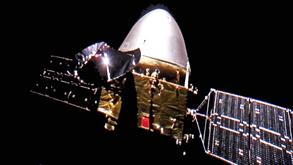 Mars probe Tianwen 1 is seen in its first selfies in space on Oct 1, 2020. (PHOTO/XINHUA)
Mars probe Tianwen 1 is seen in its first selfies in space on Oct 1, 2020. (PHOTO/XINHUA)
BEIJING - China's Mars probe Tianwen-1 is currently more than 100 million km away from Earth and is functioning normally, according to the China National Space Administration on Tuesday.
The Mars probe will likely be about 190 million km away from Earth when it reaches the vicinity of Mars
As of 9 pm on Monday (Beijing Time), the Mars probe had flown in space for 144 days and traveled more than 360 million km. It was more than 100 million km away from Earth and about 12 million km away from Mars.
Since it was launched in July, the Mars probe has captured an image of both Earth and the moon and taken selfies. It has carried out three orbital corrections, a deep-space maneuver and self-checks on multiple payloads.
It will conduct several orbital corrections before it enters Mars orbit, according to the administration.
ALSO READ: Mars probe makes mid-course maneuver
Tianwen 1, the country's first independent Mars mission, was launched by a Long March 5 heavy-lift carrier rocket on July 23 at the Wenchang Space Launch Center in Hainan province, opening the nation's planetary exploration program.
If everything goes according to schedule, the probe will travel more than 470 million km before getting captured by the Martian gravitational field in February, when it will be 193 million km away from Earth
If everything goes according to schedule, the 5-metric ton probe, which consists of two major parts – the orbiter and the landing capsule – will travel more than 470 million km before getting captured by the Martian gravitational field in February, when it will be 193 million km away from Earth.
Depending on the two planets' orbits, Mars is from 55 million km to 400 million km distant from Earth.
The mission's ultimate goal is to soft-land a rover in May 2021 on the southern part of Mars' Utopia Planitia – a large plain within Utopia, the largest recognized impact basin in the solar system – to make scientific surveys.
ALSO READ: China's first Mars mission fuels sci-fi imagination
If Tianwen 1 can fulfill all of its three objectives – orbiting Mars for comprehensive observation; landing on the planet surface; and deploying a rover to conduct scientific operations, "it will become the world's first Mars expedition accomplishing all three goals with one probe," said Ye Peijian, a leading scientist in deep-space exploration at the China Academy of Space Technology.
Zhao Lei contributed to this report


